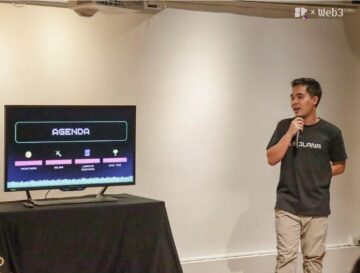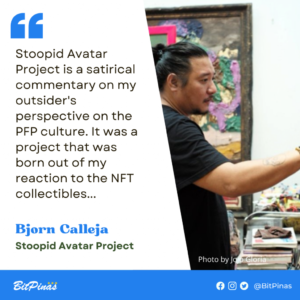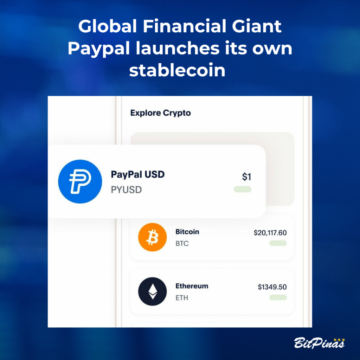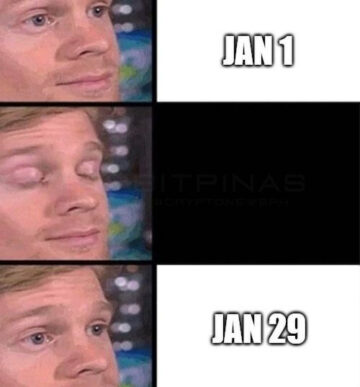- Eight #CryptoPH Champions have shared their knowledge about the current crypto situation and how their organizations are actively engaging to onboard more Filipinos in the country.
- The discussion was part of the Philippine Panel, moderated by BitPinas EIC Michael Mislos, during the ASEAN: The Next Blockchain and Crypto Hub in the World, organized by Digital Pilipinas.
- The Philippine Panel consisted of Stephanie Tower of nChain, Colin Goltra of Yield Guild Games, Ethan Rose of Pouch.ph, Camille Puentespina of Bitskwela, Mark Sy of Jia, and Kristoffer Anthony Petron of Impero Group.
From education at the grassroots level to coordinating with the regulating body, eight #CryptoPH Champions have shared their knowledge about the current crypto situation and how their organizations are actively engaging to onboard more Filipinos in the country.
The discussion was part of the Philippine Panel, moderated by BitPinas EIC Michael Mislos, during the ASEAN: The Next Blockchain and Crypto Hub in the World, organized by Digital Pilipinas.
ASEAN: The Next Blockchain and Crypto Hub in the World
The event was a webinar and happened in a Zoom meeting. Watch the replay here:
It is organized by Digital Pilipinas, a private sector-led movement that claims to create an innovation and technology ecosystem in the country that is actively engaged in a global digital economy.
Digital Pilipinas has recently partnered with multiple local and international entities focusing on the fintech industry. Read more here.
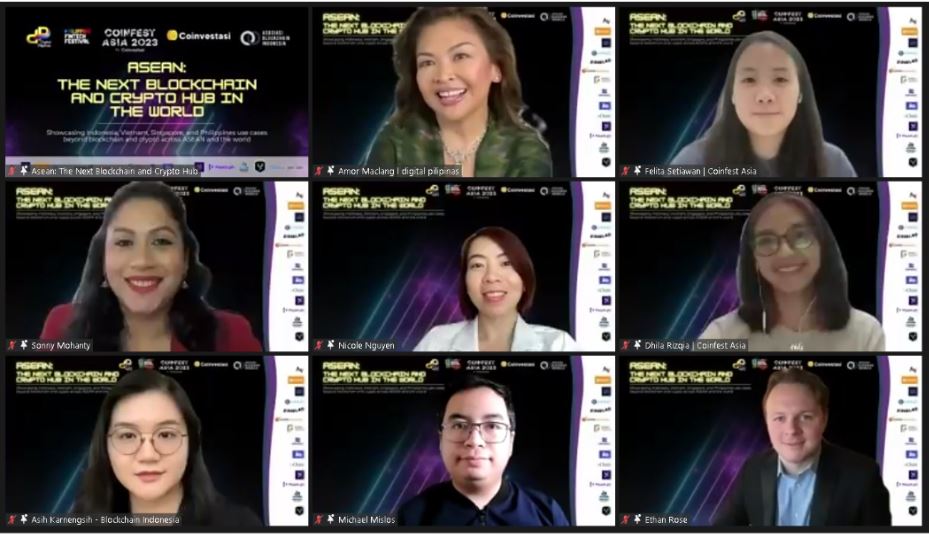
According to the movement, the event was launched because the Southeast Asia region is fast emerging to be the global hub of blockchain and crypto with four countries now having their own CBDC programs- Thailand, Vietnam, Singapore, and Cambodia. While the region’s neighbor, Japan, is known for its blockchain gaming industry.
“Digital Pilipinas is happy to be part of and support the dynamic movements in the blockchain and cryptocurrency space in ASEAN and in other equally formidable communities around the world! For 2030, it is projected that 40% of the global GDP will be going into ASEAN,” it emphasized.

The event had two panel discussions. The first one was the ASEAN Panel moderated by Dhila Rizqia of Coinfest Asia, together with Indonesia Blockchain Association Chairwoman Asih Karnengsih, APAC DAO Co-Founder Nicole Nguyen, Indonesia Crypto Network Director of Media Felita Setiawan, Finolab Japan Head and CCO Makoto Shibata, and NORDEK Blockchain Vice President for Asia Sonny Mohanty.
The Philippine Panel
Meanwhile, the Philippine Panel consisted of Stephanie Tower of nChain, Colin Goltra of Yield Guild Games, Ethan Rose of Pouch.ph, Camille Puentespina of Bitskwela, Mark Sy of Jia, and Kristoffer Anthony Petron of Impero Group.

Mass Adoption Through Use Cases
The discussion started when Tower shared that nChain is pushing to give the people of Bataan, a province along the Central Luzon region, a digital identity starting in the first quarter of 2024, which her firm believes will make the public services from the local government unit (LGU) faster and easier to access.
“I think what is important and should be part of the conversations that we’re doing is how blockchain applications can be part of and how it’s going to power the government itself. And I think if we involve the government, it will drive policies and frameworks that would make adoption faster,” she explained.
Earlier this year, nChain and the Bataan LGU signed a Memorandum of Understanding (MOU) that aims to lay down the framework for the establishment of a digital platform in Bataan that will streamline current systems and procedures for government services.
On the other hand, Rose insisted that it is not impossible to replicate what is currently happening in Boracay for the whole Philippines:
“It’s definitely reproducible. The beauty of Bitcoin as a payment system is it’s interoperable across borders. If you’re just a foreigner taking a tour, you don’t want to go pay them a money changer of 10% or pay an ATM international 250 peso fee plus a terrible exchange rate on top.”
Last year, Pouch.ph announced its plans to turn Boracay into a Bitcoin Island. Currently, more than 250 stalls and merchants are accepting BTC on the island.
Mass Adoption Through Education
Speaking about education, Bitskwela’s Puentespina highlighted that web3 natives should give assurance to people who are interested but are afraid to enter the ecosystem because of its decentralized nature:
“So what we’re trying to do is make the understanding of blockchain technology as simple as possible and as localized as possible, making sure that the educational piece doesn’t actually have that barrier. To be frank, the web3 spaces are a pretty scary area to be in when you’re starting out, especially if you don’t have the connections, the network, and of course the foundation towards it.”
Further, Sy added that one of the ways to educate and onboard more people is to teach them other more realistic use cases of crypto and blockchain, like lending and remittance.
“For us in terms of education, we first educate them on why lending is an effective way of growing your business and then educate them on how do you use the points that they earn from us and eventually educate them on how do you now use these points and convert them into tokens,” Sy shared.
This is supported by Tower, who emphasized that “we should utilize blockchain technology to produce what the country needs. In this way, we can onboard more from the grassroots and even to the regulators.”
Mass Adoption Through Accessibility and User-Experience
For Chong, producing services that give an easier user experience and are more accessible to all will onboard more Filipinos into the web3 ecosystem:
“For me, building all of these things, the projects that are working on all of these things right now—to make the experience more current and understandable—even to the ordinary individual who only has access to the Internet, who is not necessarily tech-savvy or isn’t necessarily, you know, knowledgeable on all of this newer technology—that would be the time that we would actually reach them.”
This is echoed by Goltra but in terms of gaming, where he explained that through blockchain gaming, more people learn to use a non-custodial wallet, defi, wallet connect, and more financial inclusions.
“I think gaming is an excellent vehicle to onboard more people into the crypto ecosystem. The games we saw in the last few years (2020, 2021) are just the start of this movement,” the YGG COO emphasized.
Mass Adoption Through Government and Crypto Regulation
For Bilango, it is a good thing for the #CryptoPH community that the Philippine government is open to providing clarity in terms of crypto regulation, adding that the country is one of the first countries to provide a regulatory framework that will secure users’ transactions:
“It’s not probably the perfect infrastructure. So I think, the digital asset (definition here in the country) is still limited and it’s folded into a very restrictive clause and group. But in general, our government is quite open in terms of providing more regulatory clarity in these aspects. So number one, they provided some framework in terms of how exchanges, like us, operate. Second, I think the SEC in particular is now looking into providing more framework in terms of earned products, like staking, and anything related to yield.”
Lastly, Patron shared that they are currently working with some legislators to discuss the potential of blockchain technology, the Internet of Things, and artificial intelligence to change the way the country does business and to enhance how the Philippines will be more competitive in the region.
“It also boils down to education, not educating the market, but educating the regulators. And another piece of that is being able to understand that regulators will always catch up with innovation. The BSP was still just trying to study this and up to now there is no clear governance and regulation on who will actually regulate cryptocurrency and virtual asset service providers, right? Is it the SEC? Is it the BSP? And the reason for that, again, is innovation and technology are moving at a faster rate than regulators, and outside of regulations, there’s also legislation, and we need the legislators to understand this,” Patron concluded.
This article is published on BitPinas: State of the Crypto Address: Industry Leaders Discuss Crypto Situation in the Philippines
Disclaimer: BitPinas articles and its external content are not financial advice. The team serves to deliver independent, unbiased news to provide information for Philippine-crypto and beyond.
- SEO Powered Content & PR Distribution. Get Amplified Today.
- PlatoData.Network Vertical Generative Ai. Empower Yourself. Access Here.
- PlatoAiStream. Web3 Intelligence. Knowledge Amplified. Access Here.
- PlatoESG. Automotive / EVs, Carbon, CleanTech, Energy, Environment, Solar, Waste Management. Access Here.
- BlockOffsets. Modernizing Environmental Offset Ownership. Access Here.
- Source: https://bitpinas.com/feature/industry-leaders-discuss-crypto-situation-ph/
- :has
- :is
- :not
- :where
- $UP
- 2020
- 2021
- 2024
- 2030
- 250
- a
- Able
- About
- accepting
- access
- accessibility
- accessible
- across
- actively
- actually
- added
- adding
- address
- Adoption
- advice
- afraid
- again
- aims
- All
- along
- also
- always
- an
- and
- Another
- Anthony
- anything
- APAC
- APAC DAO
- applications
- ARE
- AREA
- around
- article
- articles
- artificial
- artificial intelligence
- AS
- Asean
- asia
- aspects
- asset
- Association
- assurance
- At
- ATM
- barrier
- Bataan
- BE
- Beauty
- because
- being
- believes
- Beyond
- Bitcoin
- BitPinas
- Bitskwela
- blockchain
- blockchain applications
- blockchain gaming
- blockchain technology
- body
- Boracay
- borders
- BSP
- BTC
- Building
- business
- but
- by
- Cambodia
- CAN
- cases
- Catch
- CBDC
- central
- Champions
- change
- Changer
- chong
- claims
- clarity
- clear
- Co-founder
- Coinfest Asia
- Communities
- community
- competitive
- concluded
- Connect
- Connections
- content
- conversations
- convert
- coo
- coordinating
- countries
- country
- course
- create
- crypto
- Crypto ecosystem
- crypto hub
- Crypto regulation
- cryptocurrency
- Current
- Currently
- DAO
- decentralized
- DeFi
- definitely
- definition
- deliver
- digital
- Digital Asset
- Digital economy
- digital identity
- Digital Pilipinas
- Director
- discuss
- discussion
- discussions
- do
- does
- Doesn’t
- doing
- Dont
- down
- drive
- during
- dynamic
- earn
- earned
- easier
- economy
- ecosystem
- educate
- educating
- Education
- educational
- Effective
- eight
- emerging
- emphasized
- engaged
- engaging
- enhance
- Enter
- entities
- equally
- especially
- establishment
- Even
- Event
- eventually
- excellent
- exchange
- Exchange rate
- Exchanges
- experience
- explained
- external
- FAST
- faster
- fee
- few
- financial
- financial advice
- fintech
- Firm
- First
- focusing
- For
- formidable
- Foundation
- four
- Framework
- frameworks
- from
- Games
- gaming
- Gaming industry
- GDP
- General
- Give
- Global
- global digital
- Go
- going
- good
- governance
- Government
- grassroots
- Group
- Growing
- guild
- had
- hand
- happened
- Happening
- happy
- Have
- having
- he
- head
- her
- here
- Highlighted
- How
- HTTPS
- Hub
- i
- Identity
- if
- important
- impossible
- in
- In other
- independent
- individual
- Indonesia
- indonesia crypto
- industry
- information
- Infrastructure
- Innovation
- Intelligence
- interested
- International
- Internet
- internet of things
- interoperable
- into
- involve
- island
- IT
- ITS
- itself
- Japan
- jpg
- just
- Know
- knowledge
- known
- Last
- launched
- lay
- leaders
- LEARN
- Legislation
- legislators
- lending
- Level
- like
- Limited
- local
- Local Government
- looking
- love
- make
- Making
- mark
- Market
- me
- Media
- meeting
- Memorandum
- memorandum of understanding
- Merchants
- Michael
- money
- more
- MOU
- movement
- movements
- moving
- multiple
- Nature
- nChain
- necessarily
- Need
- needs
- network
- newer
- news
- next
- Nguyen
- no
- non-custodial
- Non-custodial wallet
- Nordek
- now
- number
- of
- on
- Onboard
- ONE
- only
- open
- operate
- or
- ordinary
- organizations
- Organized
- Other
- our
- out
- outside
- own
- panel
- panel discussions
- part
- particular
- partnered
- patron
- Pay
- payment
- payment system
- People
- perfect
- Peso
- Philippine
- Philippines
- piece
- plans
- platform
- plato
- Plato Data Intelligence
- PlatoData
- plus
- points
- policies
- possible
- potential
- potential of blockchain
- Pouch.ph
- power
- president
- pretty
- private
- probably
- procedures
- produce
- producing
- Products
- projected
- projects
- provide
- provided
- providers
- providing
- public
- published
- Pushing
- Quarter
- Rate
- reach
- Read
- realistic
- reason
- recently
- region
- Regulate
- regulating
- Regulation
- regulations
- Regulators
- regulatory
- related
- Remittance
- Restrictive
- right
- ROSE
- saw
- SEC
- Second
- secure
- serves
- service
- service providers
- Services
- shared
- she
- should
- Simple
- Singapore
- situation
- So
- some
- Southeast Asia
- Space
- spaces
- Staking
- start
- started
- Starting
- State
- Still
- streamline
- Study
- support
- Supported
- sure
- system
- Systems
- taking
- team
- Technology
- terms
- Thailand
- than
- that
- The
- The Philippines
- The Projects
- the world
- their
- Them
- then
- There.
- These
- they
- thing
- things
- Think
- this
- this year
- Through
- time
- to
- together
- Tokens
- Ton
- top
- Tour
- towards
- Tower
- Transactions
- TURN
- two
- understand
- understanding
- unit
- us
- use
- User
- User Experience
- utilize
- vehicle
- very
- vice
- Vice President
- Vietnam
- Virtual
- virtual asset
- virtual asset service providers
- Wallet
- want
- was
- Watch
- Way..
- ways
- we
- Web3
- Web3 Ecosystem
- webinar
- What
- What is
- when
- which
- while
- WHO
- whole
- why
- will
- with
- working
- world
- would
- year
- years
- YGG
- Yield
- Yield Guild Games
- you
- Your
- zephyrnet
- zoom

